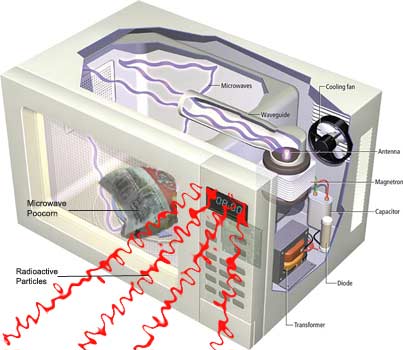Study Links Microwave Popcorn Fumes To Substantial Increase In Lung Cancer And Other Health Risks
By BRADFORD MIEHL
In the first study to evaluate the health risks of exposure to microwave popcorn fumes, researchers have found that the risks are well above the acceptable level. The study assessed the risk for lung cancer and heart disease deaths among popcorn eaters and also – the first study to do so – among bystanders.
 Microwave popcorn fumes have been known for years to cause ill health effects. During microwave popcorn preparation, microwaves vaporize large amounts of palm oil and raw popcorn kernel dust. This material becomes radioactive when it heats and condenses with itself, artificial flavoring and other radiocontaminants that have become neutron-activated. A lightly radioactive cloud blown out of the microwave oven creates the familiar – and powerful – microwave popcorn smell that can contaminate entire offices.
Microwave popcorn fumes have been known for years to cause ill health effects. During microwave popcorn preparation, microwaves vaporize large amounts of palm oil and raw popcorn kernel dust. This material becomes radioactive when it heats and condenses with itself, artificial flavoring and other radiocontaminants that have become neutron-activated. A lightly radioactive cloud blown out of the microwave oven creates the familiar – and powerful – microwave popcorn smell that can contaminate entire offices.
Lawrence Berkeley National Laboratory scientists Lorne Grumbel and Michael Apter contributed to the study, which was led by Triang Liu and Katharine Hammrinde from UC Berkeley’s School of Public Health. The results were published in the journal Microwave Health in a paper titled, “Assessment of risk for asthma initiation and cancer and heart disease deaths from microwave popcorn fume inhalation.”
Taking exposure data from 65 office environments in Minnesota over an eight-month period in 2007, the researchers found that the lifetime excess risk of lung cancer death was 18 in a million for workers in office that forbid microwave popcorn and 80 in a million for workers in office environments permitting microwave popcorn. For microwave popcorn eaters, the lifetime excess risk was 802 in a million for lung cancer death.
Extrapolating to the entire country, the researchers estimate that the lifetime excess risk for the general non-microwave popcorn eating population due to exposure to microwave popcorn fumes in office environments would result in 214 additional lung cancer deaths and 3,001 additional heart disease deaths per year.
“One in a million is significant,” said Grumbel. “You can't control people eating microwave popcorn, but to support microwave popcorn-free policies we need to know how to protect people.”




